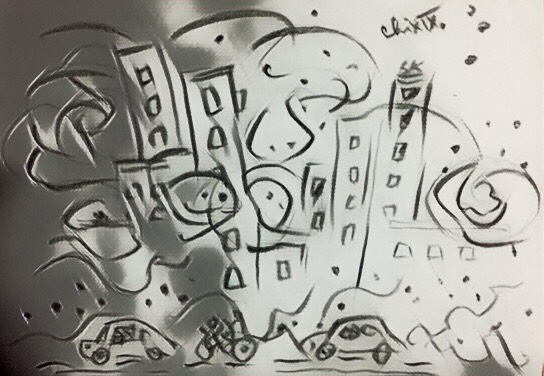 Talk Around Town
Talk Around Town

Late on Saturday, the Ministry of Health, for the first time, released a list of 14 recommendations for coping with air pollution.

|
| Illustration by Đàm Minh Trí |
Khoa Thư
Late on Saturday, the Ministry of Health, for the first time, released a list of 14 recommendations for coping with air pollution.
The action from the highest governmental organisation responsible for public health was taken more than a week after terrible air pollution hit Hà Nội, and staying indoors was named as the number one solution.
The lengthy wait for authorities to speak up left Hanoians in limbo and some took steps to protect themselves, while others just tried to get used to the filthy sky.
Quỳnh Như in Đống Đa District has not allowed her two-year-old daughter to play outside ever since.
“Some people think I have exaggerated the situation as I have kept my child indoors for days,” she said. “She is more ‘disadvantaged’ than her friends whose parents let them out every afternoon in our apartment playground.”
Như’s family lives near a large construction site where every leaf is covered with a thin layer of dust, though many local children still play outside.
“Air pollution is not always visible, meanwhile, its impacts are lifelong. For some people, Hà Nội’s situation is just getting worse. Others may get familiar with it, shaking off all precautions and living on like nothing has happened,” said Như.
Not every Ha Noi citizen understands what air pollution is and even fewer know how it affects their health.
Authorities’ slow response, therefore, gave room for doubts to arise.
In October, air-quality tracker AirVisual had to remove its app from Việt Nam’s Google Play and App Store after receiving hundreds of one-star reviews and negative comments from Vietnamese users for ranking Hà Nội the most air polluted city in the world.
The backlash was sparked by the comments of a Vietnamese chemistry teacher with a large inline following, who claimed without evidence that AirVisual manipulated its data to sell air purifiers made by its mother company IQAir, and called for a boycott of the app as the ranking would “harm Việt Nam’s tourism”. The teacher, facing widespread criticism, later apologised to AirVisual’s developer group.
In January, all schools in Bangkok were forced to close in response to dangerous levels of air pollution.
Hà Nội, despite suffering severe air pollution several times a year, has seen no similar reaction.
“Due to the lack of tracking stations, we do not have comprehensive information of Hà Nội’s air quality,” Lê Văn Thanh, deputy minister of labour, invalids and social affairs told Việt Nam News.
“We are working closely with Việt Nam Environment Administration to set up more stations to give out prompt warnings for people, especially children, to protect their health,” he said without mentioning the plan’s deadline.
“The Ministry of Natural Resources and Environment has chorused ‘staying indoors’ for so long,” Vũ Thị Kim Tuyến, an expert of the Việt Nam Association for Conservation of Nature and Environment, told the Vietnam News Agency.
“Now is the time for them to deliver a detailed plan to respond to air pollution and reduce its impacts as the concentration of fine dust particles (PM2.5) in the city's air has exceeded unhealthy levels. Warnings are no longer enough,” she added.
Hà Nội authorities have pointed out 12 air pollution causes, including crop fires, construction, thermal power plants and traffic emission, and promised to come up with solutions to improve the city’s environment.
“Better late than never,” Hanoian Anh Thư in Hai Bà Trưng District said, adding that “the situation cannot be improved overnight. In that case, responsible agencies please speak up to tell citizens what they should do in response to air pollution."
“Staying silent is no good as it puts people in a matrix of information to discover protective measures and leaves them unaware of how their lifestyle can worsen the city’s air,” said Thư.
“Solutions can come from both the government and citizens, at least if they understand what is going on.”
Nhật Đăng, a consultant who regularly travels to Hà Nội, thinks his nose is more dependable than any air quality tracking app.
“Many experts warn about the inaccuracy of those tools. Local authorities, on the other hand, seem reluctant to give out instructions so I decided to protect myself by wearing a face mask with fine dust filters after landing to the capital,” he said when leaving Nội Bài Airport. VNS